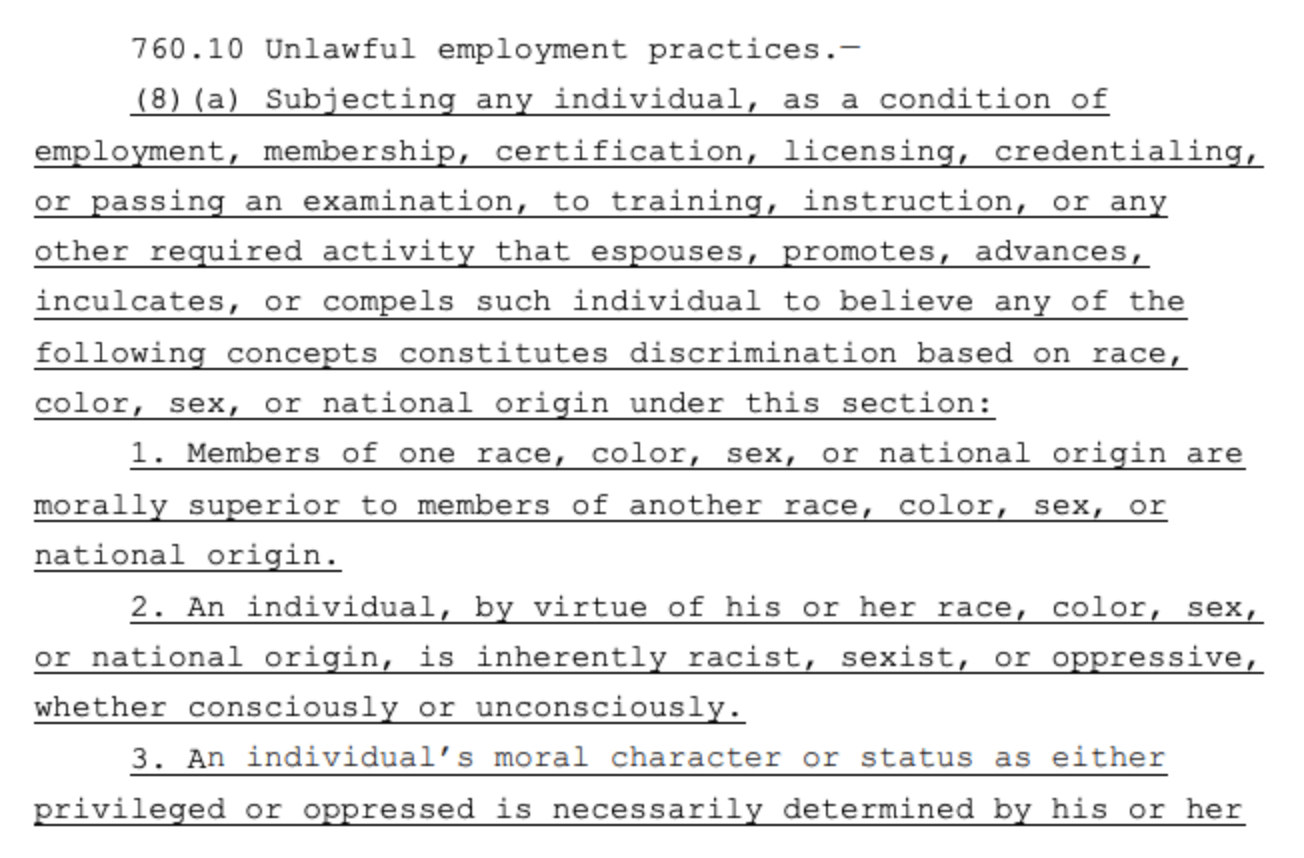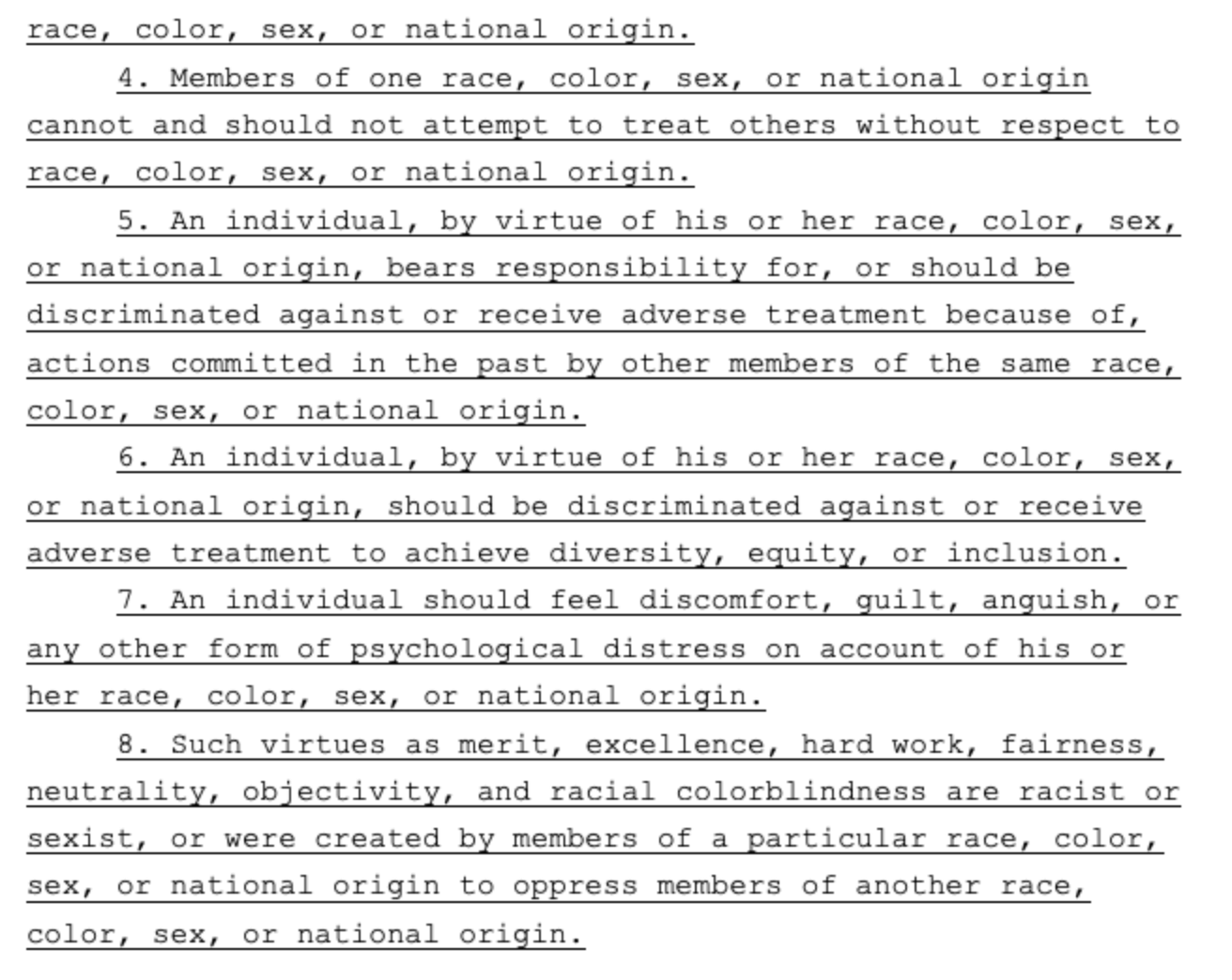Here we go again: a favorite writer of mine is misinterpreting laws against the new wokeism. Last time it was David French. This time it is Allahpundit, whose post is titled Does a new Florida bill prohibit schools and businesses from causing whites “discomfort” or “guilt”? and begins by answering the question in this way:
That’s how the Associated Press’s deliberately inflammatory headline frames the stakes here. Are they right?
Short answer: Not really, but sort of?
Longer answer: The bill is facially neutral as to race. It doesn’t bar schools and businesses from causing “discomfort” or “guilt” to whites specifically during instruction or training. It bars them from causing discomfort or guilt on the basis of race with respect to any race. If you uncork a white supremacist rant while addressing your staff or your classroom, you’d face consequences under this law.
That’s my bold emphasis, there to indicate that the part in bold is wrong. The Associated Press is wrong, all right, but not because the bill applies to all races and not just whites. It’s wrong because the bill itself does not bar schools and businesses from “causing discomfort or guilt on the basis of race with respect to any race” (to quote Allahpundit’s mistaken characterization). Rather, it bars schools and businesses from teaching people that they should feel discomfort or guilt because of their race.
That’s a different concept.
Don’t take my word for it. Allahpundit quotes the relevant provisions. See for yourself:


The ban here is not on instruction that causes whites (or any race) to feel guilt or discomfort. The ban is on instruction that tells whites (or any race, color, sex, etc.) that they should feel guilt or discomfort on account of their race. Specifically, the law bans instruction that any individual “should feel discomfort, guilt, anguish, or any other form of psychological distress on account of his or her race, color, sex, or national origin.” I emphasize the word “should” because that is the key word.
There is a meaningful distinction between banning instruction that might cause people anguish due to the color of their skin, and teaching them that they should feel anguish due to the color of their skin. The former teaching is a potential consequence of any teaching about our country’s history of racism. The latter teaching is un-American.
The error permeates Allahpundit’s post. He says (my bold emphasis):
Where does all of that leave us? If a teacher tells his students that “white people oppressed black people for hundreds of years in the United States,” is that actionable under this statute? It might cause white students “discomfort” or “guilt” to hear whites indicted as a race that way. But how else should it be put? Saying that certain whites oppressed certain blacks wouldn’t capture the extent to which African-Americans were subjugated systematically and institutionally before the civil rights era. You can see why Dems worry that some parents acting in bad faith might try to steer schools away from teaching ugly chapters of American history altogether for fear of inadvertently landing in legal jeopardy under the bill.
The answer is no: it would not be actionable. Teaching about race that “might” cause white students to feel discomfort or guilt is not the same as teaching white students that they “should” feel discomfort or guilt due to their skin color. Teachers can manage to explain to their students that white people oppressed blacks throughout most of this nation’s history, without the need to add the observation that as a result of this history, the white kids in the class should feel bad for being white.
Allahpundit errs again when discussing the workplace restrictions:
At what point does the First Amendment protect a boss’s right to cause “discomfort” to his employee by stating a political opinion, particularly if he has facts to back it up? I’m guessing we’re eventually going to find out.
But the issue here is not an employer’s right to cause discomfort, but his right to tell his employee that the employee should feel discomfort because of the employee’s race. To me, the latter (which is what the law actually bans) is a form of race discrimination itself — but to the extent that this is unclear under current law, this bill makes it crystal clear. Such statements have no place in the workplace.
Regular readers will recall that this is the same error David French, Kmele Foster, Thomas Chatterton Williams, and some partisan lefty made in their New York Times piece on so-called “anti-CRT laws.” As I explained at the time:
If French, Foster, Williams, and Stanley were accurately characterizing the laws, I would be in agreement with them here. Our kids simply must be taught the history of slavery and Jim Crow, just like German kids need to be taught about the Holocaust. No sane person disagrees. And an accurate account of that history of governmental oppression of one race no doubt “could” and likely “would” cause many kids to feel anguish. Banning laws that “could” or “would” cause kids such anguish cannot possibly stand.
Here’s the thing, though: that’s not what the laws say. Instead, they make a very important distinction by banning teachers from teaching kids that individuals “should” (not could, not would, but should) feel anguish on account of their race or sex. In other words, the laws target the project of some anti-racists to make white people feel guilty simply because of the color of their skin.
I continue to admire David French, and I consider Allahpundit to be the best writer on the Web. But they are both misinterpreting, in a similar fashion, laws designed to fight the scourge of racism that currently operates under the misleading banner of “anti-racism.” No reasonable person wants to ban teaching about the history of racism, even though such teaching might have the incidental effect of causing some whites to feel guilt as a result of their ancestors’ actions. That is quite different from teaching people that they should feel guilt for their “white privilege” — a concept that is at the heart of a best-selling book, and which is far more prevalent than critics give it credit for.




